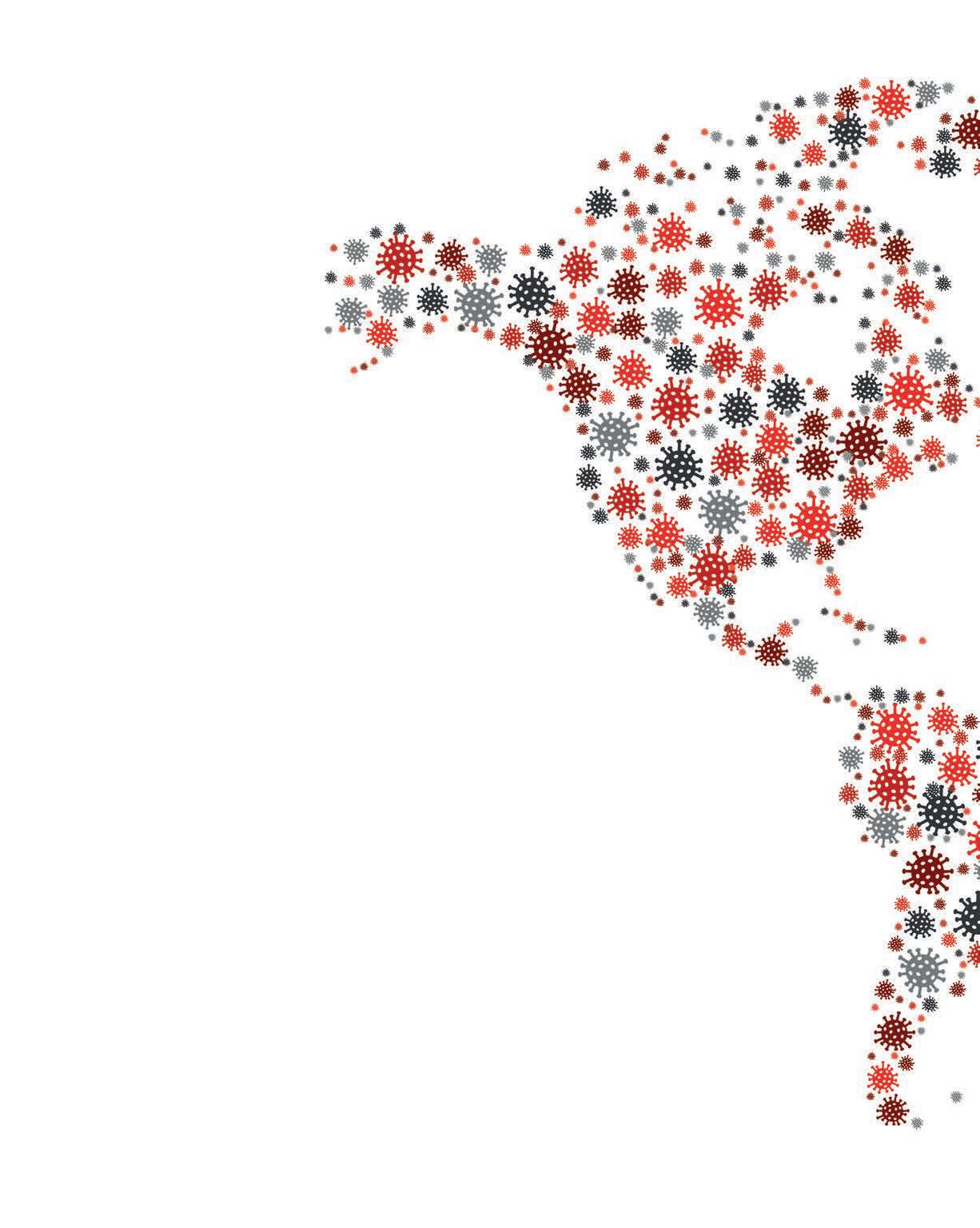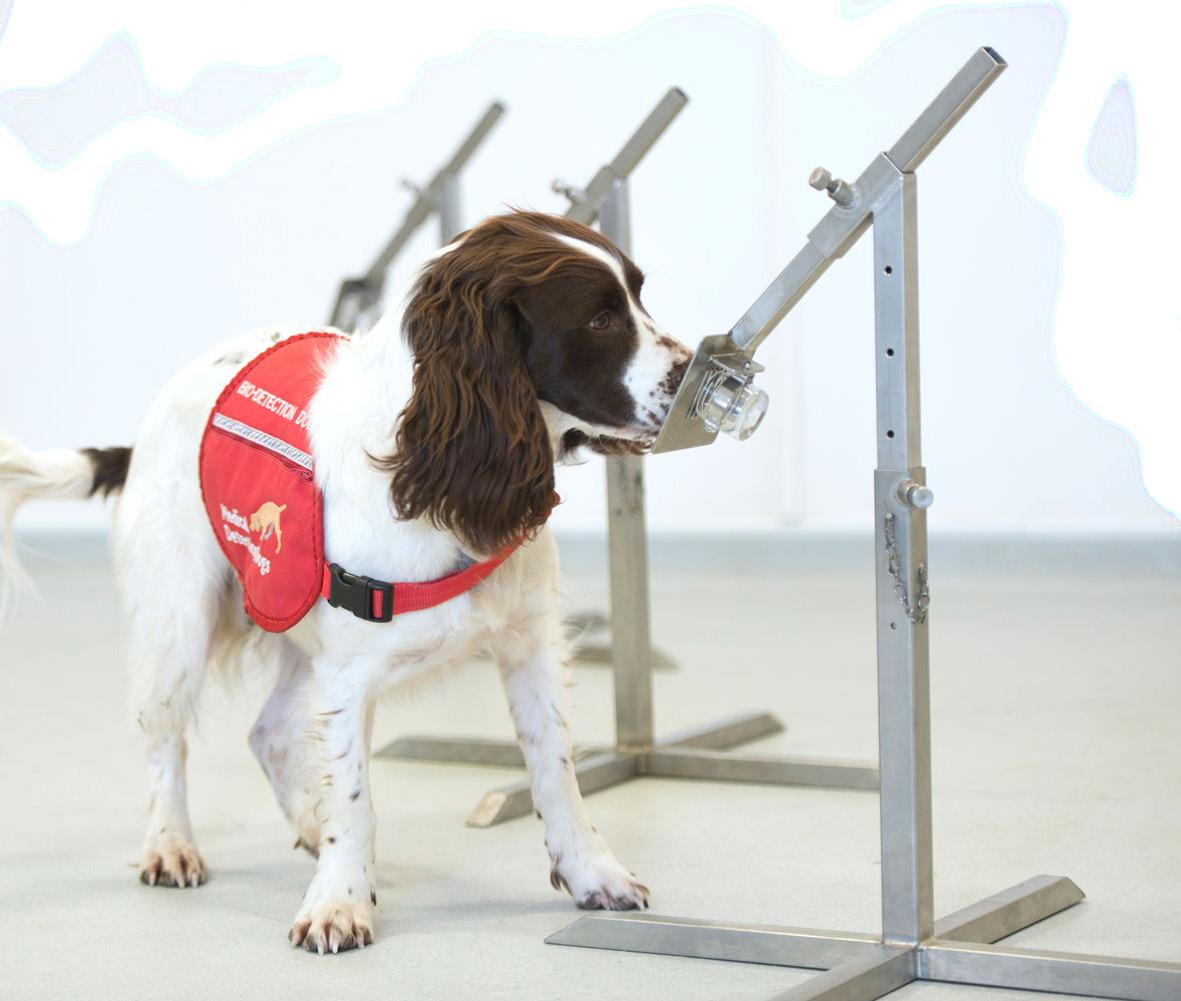
7 minute read
On the front line
Photo: © Heidi Larson
By Tommy Bullen
The London School of Hygiene & Tropical Medicine is one of the many University of London Member Institutions who are playing a key role in the response to the COVID-19 pandemic.
The director of the London School of Hygiene & Tropical Medicine (LSHTM), Professor Peter Piot, has spent his career researching deadly infectious diseases; however, even he was shocked by the severity of COVID-19 when he became infected earlier this year. This new virus took the world by surprise, and with societies around the world facing unprecedented public health challenges, there’s an urgent need for scientists to provide solutions.
With a strong track record of responding to emergencies and major outbreaks, LSHTM’s expertise has played a role in the pandemic response worldwide – and its research has only been part of the story. Many clinically trained staff and students have returned to work in the NHS, the communications team has been working tirelessly to tackle the wave of misinformation about the pandemic, and professors and alumni are advising the UK government and organisations including the World Health Organization and the Africa Centres for Disease Control and Prevention.
Modelling: predicting the unpredictable
The first scientists at LSHTM studying the virus in the earliest days of the pandemic were those at the Centre for Mathematical Modelling of Infectious Diseases. An initial paper published in January provided one of the first estimates of the reproductive rate (R0) of the virus in Wuhan.
Prof John Edmunds, part of the modelling team, said in the LSHTM Viral podcast in late January: “I think the probability of the coronavirus coming to the UK and spreading widely in the UK is very high. I think that there’s very little chance that it’s not going to spread everywhere in the coming months. The consequences? We don’t know yet.” As the modellers were acutely aware, more information was urgently needed to understand the risk the virus posed to the rest of the world.
When hundreds became infected aboard the Diamond Princess cruise ship in February, it highlighted how easily the disease could spread. LSHTM scientists estimated that nearly five times as many aboard could have become infected, had the ship not imposed strict quarantine measures. Lead researcher Prof Annelise Wilder-Smith forewarned that: “In Europe we need a change in mindset, and to potentially implement more draconian measures than we’ve probably ever seen in the continent.”
As the virus then reached the UK, the modellers turned their attention to studying the pandemic at home, publishing papers in March and April estimating the critical-care bed capacity, the proportion of cases being reported, the UK R number and the impact of different lockdown measures. This provided much-needed information to the government at a time of national crisis, with all of their findings publicly available.

FAKE NEWS
A poll conducted by The Guardian in May indicated that 51 per cent of people had seen fake news about coronavirus on social media, while 64 per cent of voters were now more likely to listen to expert advice from scientists and researchers.
Here are five ways LSHTM has provided accurate information during the pandemic:
1. LSHTM Viral – the School’s podcast interviews experts on the science behind the pandemic, with over 100,000 episode streams.
2. Live Q&A – this YouTube series provides the answers to public questions, straight from the experts.
3. In the news – LSHTM research and expert commentary on COVID-19 appeared in more than 66,000 pieces of global media coverage between January-June 2020.
4. Coronavirus books for children – researchers teamed up with leading illustrators and publishers to provide free educational resources for children.
5. COVID-19 education – LSHTM’s free online course brought the latest coronavirus research to over 200,000 participants.
Follow @LSHTM on Twitter, Facebook and Instagram to get the latest COVID-19 news.
Africa: the next frontier?
As the virus raged in Europe and began to take hold in the Americas, fears were growing that Africa would become the next COVID-19 hotspot. The continent has crowded cities, large, multigenerational households and people battling existing health conditions. Prof Francesco Checchi, an LSHTM epidemiologist, explained: “That all amounts to a very worrying picture in terms of how the virus can be transmitted in these settings, but also the risk to individuals of developing severe disease. But what is perhaps most concerning is the baseline state of health services in these countries.”
LSHTM’s Medical Research Council (MRC) Unit in The Gambia and the MRC/UVRI (Uganda Virus Research Institute) & LSHTM Uganda Research Unit were at the forefront of stepping up the response. They offered their labs and expertise to boost national testing capacities, critical to local contact tracing and quarantining efforts. They continue to monitor the spread of the disease in population samples from across Africa and are using machine learning to provide real-time analyses of its evolving biology.
As ‘wash your hands’ became the new mantra for people around the world, this was easier said than done in low-resource countries, where soap and clean water aren’t readily available. Underpinned by behavioural science research, LSHTM experts developed and trialled single-use soap tabs in Tanzania, aimed to increase handwashing while reducing cross-contamination from bars of soap. And with global supplies of PPE and medical equipment drying up, LSHTM teams in The Gambia began 3D-printing their own protective equipment and ventilators. Dr Babatunde Awokola, who specialises in respiratory medicine, explained: “We recently innovated the printing of face shields. This is one of the tools that is important to ensure health workers on the frontline are not getting infected.”
Barking mad? The dogs learning to sniff out COVID-19

In May, LSHTM launched a clinical trial in partnership with Medical Detection Dogs and Durham University and funded by the UK Government, to find out if dogs could be trained to accurately detect people with COVID-19, even if asymptomatic.
This team previously worked together to demonstrate that dogs can detect odours from humans with malaria with extremely high accuracy. If the trial gathers sufficient evidence, the first set of dogs could be deployed to key points of entry into the UK within six months to assist with the rapid screening of people travelling from abroad.
Vaccines: a future without COVID-19?
With cases still increasing in many parts of the world, and those that have brought the virus under control prone to flare ups, it seems hard to imagine a future without COVID-19. Many scientists agree that hopes of life returning to normal rest on the discovery of a safe and effective vaccine. Earlier this year LSHTM launched a vaccine tracker – an online tool to monitor the progress of every COVID-19 vaccine in development worldwide.
However, administering COVID-19 vaccines brings its own challenges, including scaling up manufacturing to potentially billions of doses. LSHTM is part of the Vaccines Manufacturing Innovation Centre, which received an additional £131 million in May from the UK government to fast track the building of its permanent facility, and will be able to produce 70 million vaccine doses within 4-6 months once a vaccine is approved.
There are also concerns about the consequences of the disease on existing immunisation programmes, many of which are on hold due to overstretched healthcare systems. As Prof Beate Kampmann, director of LSHTM’s Vaccine Centre explained: “More people died of measles in the Congo than died of Ebola in the latest outbreak. I’m really concerned that routine vaccination clinics will be downscaled, or that people will be very worried about coming to these clinics…and that might leave a whole generation of children exposed to vaccinepreventable infections.” If a COVID-19 vaccine is developed, it will be vital that existing immunisation programmes are not further deprioritised, leading to deadly outbreaks of readily preventable diseases.
What next?
As the pandemic continues to unfold across the world, it’s increasingly likely that the virus is here to stay. Peter Piot said: “We will need to reverse our thinking about this epidemic; this is going to be about societies living with COVID-19. It could become endemic, it could become part of our human condition.” The work at LSHTM is far from over.
Find out more about LSHTM’s ongoing work at: bit.ly/LSHTM-COVID19
Tommy Bullen is Communications Officer at the London School of Hygiene & Tropical Medicine, one of the University of London’s 17 Member Institutions.
Alumni stories: Dr Mininim Oseji

Dr Oseji, an alumna of four LSHTM courses, is Permanent Secretary for the Delta State Ministry of Health in Asaba, Nigeria, and National President of the Medical Women’s Association of Nigeria.
In response to the coronavirus pandemic, Dr Oseji has led a team of volunteers who have been coordinating donations of reusable facemasks for the elderly, using social media to inform people about how to prevent catching the virus, and promoting the use of telemedicine to provide safe, remote medical care.
She has also been working to strengthen the health system in Delta State and ensure lessons are learned from the pandemic to safeguard the future sustainability of healthcare in the region. “So far, the measures taken have helped to curb the spread of the disease in Delta State where I live and work.”










